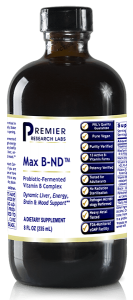We’ve all heard of Vitamins A, C, D, and E. You’ve likely heard of Vitamin B, as well. However, it’s better referred to as Vitamin B Complex or B Vitamins. Why? It actually includes eight different essential B Vitamins! You may be more familiar with several of the B Vitamins by their alternative names.
What are the B Vitamins and What Do They Do?
The B Vitamins play an important role in your body function. B Vitamins contribute to brain, metabolic, nervous system, and adrenal health. They include:
- Vitamin B1: Thiamin
- Vitamin B2: Riboflavin
- Vitamin B3: Niacin
- Vitamin B5: Panthothenic Acid
- Vitamin B6: Pyridoxine
- Vitamin B7: Biotin
- Vitamin B9: Folate
- Vitamin B12: Cobalamin
What Does a Deficiency* Look Like in Each of the B Vitamins?
Because the B Vitamins play such an important role in several factors of your health and body function, the symptoms of deficiencies are quite varied. They can appear as mental or brain-related symptoms, nerve-related symptoms, energy-related symptoms, skin or muscle conditions, or even digestive disorders.
 B1 (Thiamin) Deficiency
B1 (Thiamin) Deficiency
A Thiamin deficiency is known as Beriberi, which has three subtypes. It is more common in developing countries than developed countries, and is also more prevalent among alcoholics.
B2 (Riboflavin) Deficiency
A Riboflavin deficiency is not common in the United States, due to fortifying foods like grains and cereals. Symptoms may include weakness, soreness or swelling of the throat and tongue, cracked skin, dermatitis, anemia, or affected vision.
B3 (Niacin) Deficiency
Pellagra is a a niacine deficiency disease which includes symptoms of diarrhea, depression, dementia, or dermatitis. There was an epidemic of pellagra in certain areas of the United States for almost four decades in the early 1900s. Pellagra primary affects developing countries, however, secondary pellagra can occur if your body does not properly absorb niacin. Alcoholism, eating disorders, medications such as immunosuppresive drugs, and gastrointestinal disorders can affect niacin absorption.
B5 (Pantothenic Acid) Deficiency
A Vitamin B5 deficiency is extremely rare, but presents itself with very common symptoms. These symptoms include constipation, insomnia, loss of appetite, fatigue, numbness or burning of the hands and feet, headaches, vomiting and intestinal discomfort.
B6 (Pyridoxine) Deficiency
Symptoms of a Vitamin B6 deficiency include confusion, depression, insomnia, dermatitis, cracked lips, and an inflamed tongue.
A deficiency may also lead to nerve damage in the hands and feet, and, in woman, has been linked to cervical dysplasia. Individuals who battle alcoholism, cirrhosis, or hyperthryoidism run a higher risk of B6 deficiency.
B7 (Biotin) Deficiency
Biotin deficiency is rare, since your body doesn’t need a lot and is efficient at recycling it. Certain medication may increase risk of deficiency, including anti-seizure medications or extended antibiotics. Individuals with malabsorption are also at increased risk.
Symptoms include seborrheic dermatitis (may present scaly patches, red skin, and stubborn dandruff), brittle hair, hair loss, muscle pain, and intestinal and nervous system issues.
B9 (Folate) Deficiency
Folate is a well-known B Vitamin, especially amongst pregnant women. That’s because a Folate deficiency increases the risk of birth defects, pregnancy loss, and low birth weight. However, it’s also linked to non-pregnancy related issues such as memory loss.
B12 (Cobalamin) Deficiency
A deficiency in B12 includes symptoms of fatigue, poor balance, memory loss, constipation, and depression. Decreased stomach acid can impair the absorption of Vitamin B12 from food. As decreased stomach acid is more common in individuals age 50+, this population is more likely to experience a Vitamin B12 deficiency. Long-term use of proton-pump inhibitors (which suppress stomach acid) may also leave people prone to a B12 deficiency.
If Deficiencies* are Rare, Why Take a Supplement?
Although official deficiencies in the B Vitamins are not exceedingly common, it’s easy to fall short of optimal levels of Vitamin B. In other words, it’s more common to have a Vitamin B insufficiency. This is especially try in today’s environment, which is filled with things that deplete your Vitamin B, such as stress, caffeine, alcohol, refined sugars and starches, digestive disorders, and certain medications (including antibiotics, NSAIDs, and birth control pills).
Taking a Vitamin B Complex supplement can help maintain optimal levels of each B vitamin to best support your body’s metabolic and adrenal functions, and your nervous system.
Why Do We Choose Max B?
We’ve chosen to carry Max B for several reasons. It’s produced by Premier Research Labs (PRL), a brand that we trust, that focuses on producing high-quality supplements that are non-toxic and free from excipients. PRL was founded by a clinical nutritionist, and their labratory uses chromatography and bioenergetic testing to make sure their raw materials meet their quality standards.
Read Dr. Rob Lindsey’s own experience with Max B and how it helped him regain joy.
Max B is a popular supplement choice at Valeo, and as such, we email occasional discount coupons for this product. You can subscribe to our emails here.



